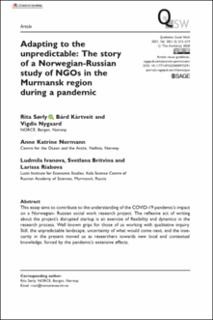| dc.contributor.author | Sørly, Rita | |
| dc.contributor.author | Nygaard, Vigdis | |
| dc.contributor.author | Kårtveit, Bård | |
| dc.contributor.author | Normann, Anne Katrine | |
| dc.contributor.author | Riabova, Larisa | |
| dc.contributor.author | Ivanova, Ludmila | |
| dc.contributor.author | Britvina, Svetlana | |
| dc.date.accessioned | 2021-07-15T07:13:29Z | |
| dc.date.available | 2021-07-15T07:13:29Z | |
| dc.date.created | 2020-10-05T08:39:51Z | |
| dc.date.issued | 2021 | |
| dc.identifier.citation | Qualitative Social Work. 2021, 20 (1-2), 312-319. | |
| dc.identifier.issn | 1473-3250 | |
| dc.identifier.uri | https://hdl.handle.net/11250/2764470 | |
| dc.description.abstract | This essay aims to contribute to the understanding of the COVID-19 pandemic’s impact on a Norwegian- Russian social work research project. The reflexive act of writing about the project’s disrupted startup is an exercise of flexibility and dynamics in the research process. Well known grips for those of us working with qualitative inquiry. Still, the unpredictable landscape, uncertainty of what would come next, and the insecurity in the present moved us as researchers towards new local and contextual knowledge, forced by the pandemic’s extensive effects. | |
| dc.language.iso | eng | |
| dc.title | Adapting to the unpredictable: The story of a Norwegian-Russian study of NGOs in the Murmansk region during a pandemic | |
| dc.type | Peer reviewed | |
| dc.type | Journal article | |
| dc.description.version | publishedVersion | |
| dc.source.pagenumber | 312-319 | |
| dc.source.volume | 20 | |
| dc.source.journal | Qualitative Social Work | |
| dc.source.issue | 1-2 | |
| dc.identifier.doi | 10.1177/1473325020973291 | |
| dc.identifier.cristin | 1836926 | |
| dc.relation.project | Norges forskningsråd: 303247 | |
| cristin.ispublished | true | |
| cristin.fulltext | original | |
| cristin.qualitycode | 2 | |
